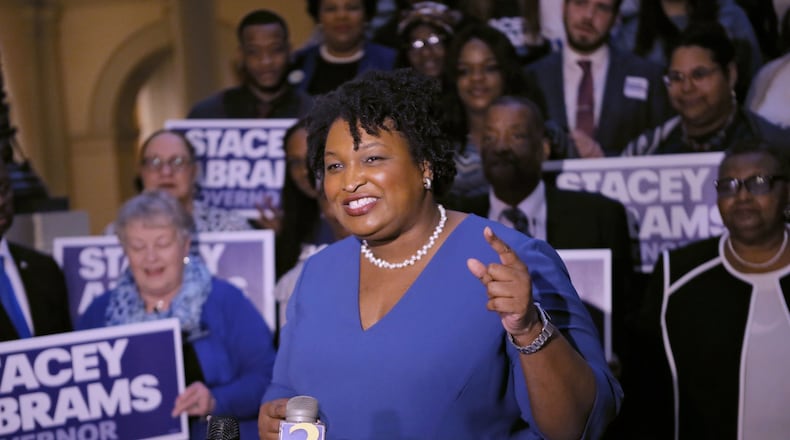Democratic candidate for governor Stacey Evans is raising doubts about a major voter registration effort founded by her primary election rival Stacey Abrams, whose rise to national prominence is fueled in part on the promise that she can reach new voters.
Evans questioned Abrams’ assertion that she has helped register more than 200,000 Georgia voters since 2013, when she founded the New Georgia Project.
Evans, who faces Abrams in Tuesday's Democratic Party primary, demanded a "full accounting" of how many new voters were registered, saying federal election data fail to back up Abrams' assertions.
“The figures don’t match her claims, and that’s why we need clear answers. We need to get to the bottom of this. That’s why transparency and accountability are so important here,” Evans said in an interview. “She’ll have some explaining to do.”
Abrams' campaign rejected Evans' attack on her work with the New Georgia Project, a nonprofit organization trying to boost the number of registered voters who are minorities and under 30 years old.
“Evans’ false accusations have been proven wrong again and again as Stacey Abrams and organizations like the NAACP have successfully fought to register voters and bring (Republican Secretary of State Brian) Kemp’s voter suppression to light,” Abrams spokeswoman Priyanka Mantha said. “Stacey Abrams is the only voting rights champion in this race.”
It’s unclear how many of the 209,940 voter registration forms the New Georgia Project says it submitted resulted in new voters on the rolls.
Voter registration numbers from the U.S. Election Assistance Commission show that the total number of new registrations in Georgia declined in 2014 to 2016 — when Abrams and the New Georgia Project said they were signing up hundreds of thousands of voters — compared with similar election cycles in 2010 and 2012.
But the Abrams campaign said those figures don’t discredit the New Georgia Project’s work.
Of the 86,000 voter registrations the organization submitted in 2014, for instance, 64,000 were put on government voter lists by the fall of 2015, according to the New Georgia Project. Those applications included new voters, previously inactive voters and voters who changed their addresses.
The rest of the applications were duplicates or canceled, often because names, addresses or birth dates couldn’t be verified by election officials.
County election officials were swamped by paper applications from the New Georgia Project, Muscogee County Elections Director Nancy Boren said. Most of those applications were changes to existing voter information or duplicate registrations rather than new registrations, according to data she compiled for Muscogee County.
“Even though you may have submitted 200,000 pieces of paper, it’s not going to equate to 200,000 new registrants,” Boren said.
The Rev. Raphael Warnock, the chairman for the New Georgia Project, said the organization is working to enable more Georgians to vote.
“I am deeply saddened that those who claim to want a robust, engaged and representative electorate would stoop to launching attacks on registration efforts like the New Georgia Project for political gain,” Warnock said.
The number of registered African-American voters in Georgia — a core group targeted by the New Georgia Project — has increased since the organization started its voter registration drive, according to an analysis of state election data by The Atlanta Journal-Constitution.
There were 362,205 more black voters registered in Georgia in 2018 than in 2010, according to the registration figures. A total of 1,849,294 active black voters are registered in Georgia, which is 30 percent of the 6.1 million registered voters statewide. About 32 percent of the state's population is black, according to the U.S. Census Bureau.
Evans said the public deserves to know exactly how much of an impact the New Georgia Project had on the state's overall voter registration numbers. Evans said Abrams should show that she made a difference while she was paid $177,500 as the organization's CEO in 2014, then scaled back her hours and salary to about $85,000 in 2015.
Abrams frequently speaks about her efforts to engage disaffected voters to add credibility to her campaign for governor.
"As a civic leader, I helped secure the right to vote for more than 200,000 Georgians by helping them get registered," she said last month in an interview with AJC editors and reporters.
While it’s difficult to estimate how many new voters Abrams helped register, generally 70 percent of applications from voter registration drives are for new voters, according to her campaign. The rest of the applications are often changes to existing registered voters.
The New Georgia Project and Abrams blame the Secretary of State's Office for rejecting many registration applications and for purging inactive voters from the state's voter lists.
Kemp said the New Georgia Project submitted tens of thousands of incomplete paper registration forms, making it difficult to verify their accuracy.
“These left-leaning groups put a stack of paper out there and say the secretary of state isn’t registering 80,000 people,” said Kemp, a Republican candidate for governor. “We couldn’t register all of those forms because there was some sort of problem with them — they were missing a name or an address. … It’s ridiculous that they would blame the secretary of state for that.”
New voter registrations
2010: 544,526
2012: 768,407
2014: 364,382
2016: 712,035
Source: U.S. Election Assistance Commission
2018 campaign
The Atlanta Journal-Constitution is covering the issues and candidates ahead of Georgia's primary on May 22. The AJC has already produced stories looking at gun rights, tax policy and how President Donald Trump factors in the stances candidates are taking. It also has conducted polls to determine what's most important to voters from the two major political parties. Look for more at PoliticallyGeorgia.com.
About the Author
Keep Reading
The Latest
Featured





